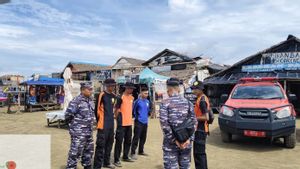Spokesperson for the COVID-19 Task Force, Prof. Wiku Adisasmito, stated that the principle of vigilance against the risk of COVID-19 transmission still needs to be implemented following the pandemic situation in the world has not been fully controlled.
"Seeing that the world situation is still not under control, the principle of vigilance and caution still needs to be applied," said Wiku Adisasmito in a press statement on the Development of Handling COVID-19 in Indonesia which was followed by a network from Jakarta, Antara, Thursday, December 22.
According to Wiku, the COVID-19 pandemic in Indonesia has been under control, which is marked by community activities that can be carried out as usual like before the pandemic hit.
When viewed by the addition of weekly positive cases in the country, all active cases and weekly deaths have decreased in at least the last three weeks.
Positive cases and active cases had increased for four weeks at the end of October 2022, weekly positive cases rose from 19,000 cases to 46.000 cases per week with an average of 6.500 cases per day.
However, the increase in cases in Indonesia did not last long. In the last four weeks, it has decreased significantly to 10,000 cases per week, or an average of around 1,400 cases per day, active cases are currently around 29,000 cases per day.
According to Wiku, the decline in cases was also accompanied by a decrease in the death rate due to COVID-19. As of December 18, 2022, the weekly death rate reached 174 people with an average of 24 deaths per day.
The average daily cure rate has also been maintained at 96 percent throughout 2022, even in the last two months it has remained at 97 percent.
"Seeing the existing data related to the development of the COVID-19 pandemic in Indonesia seems to be under control," he said.
When viewed globally, said Wiku, there is a weekly positive trend in five countries, namely Japan, South Korea, Australia, Germany and China.
"Of the five countries, only China has a much higher rise than the previous peak. The rest have increased but not as high as the previous peak," he said.
The five countries are still experiencing additional positive cases from an average of around 16,000 to 142,000 cases per day.
Meanwhile, neighboring countries in Indonesia such as Singapore and Thailand are stable at 8,000 and 3,000 weekly cases.
Wiku added that the relatively controlled situation in Indonesia needs to be addressed by the public with the principle of vigilance in daily activities, especially ahead of the 2022 Christmas and 2023 New Year holidays.
Even though it can be done like when it was normal, for a minimum, wear a mask and wash your hands frequently with water or hand sanitizer.
"Moreover, the potential for a higher increase in cases at the end of the year is due to increased community activities and the cooperation of all parties from the central, regional governments, providers of entertainment venues and the community is needed to create a safe environment for COVID-19," he said.
The English, Chinese, Japanese, Arabic, and French versions are automatically generated by the AI. So there may still be inaccuracies in translating, please always see Indonesian as our main language. (system supported by DigitalSiber.id)
Most Popular Tags
#Prabowo Subianto #New Year #Mother's Day #nataru #NatalPopular
22 Desember 2024, 05:34
22 Desember 2024, 00:05
22 Desember 2024, 06:15
22 Desember 2024, 01:06













